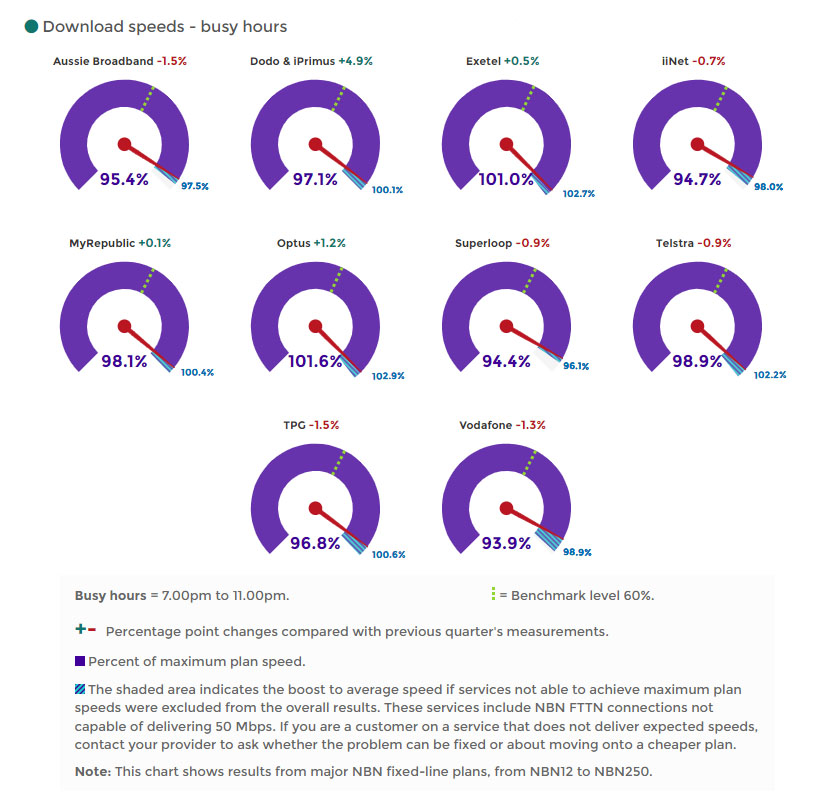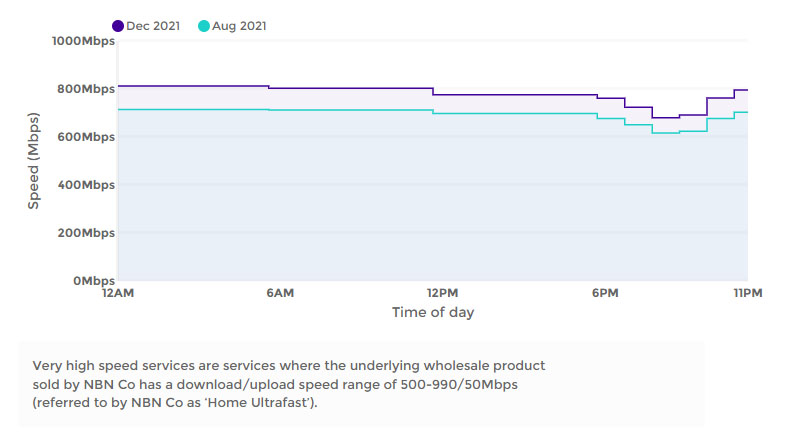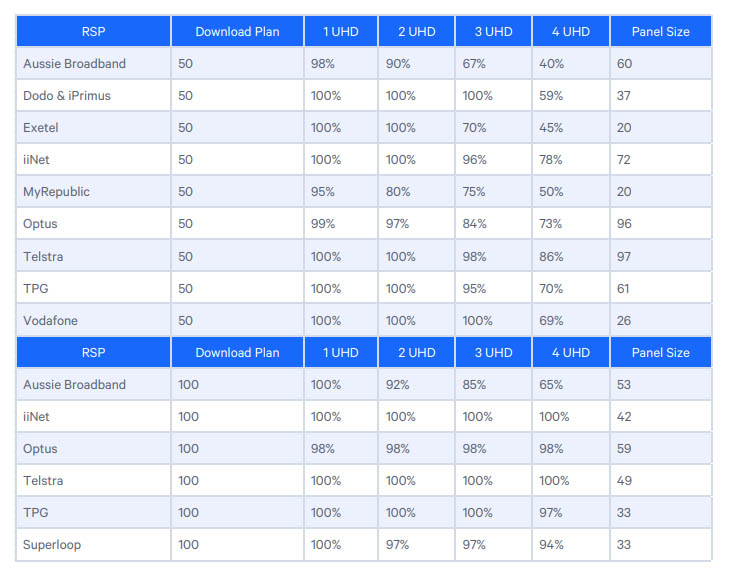Customer watchdog The Australian Competition and Consumer Commission (ACCC) is back with another Measuring Broadband Australia report, pitting the country’s eleven best-known NBN providers against one another in a battle to be crowned the fastest telco. After a stunning victory in last quarter’s report, Exetel remains neck-and-neck with one of Australia’s biggest brands when it comes to download speed — but has narrowly missed out on taking home the gold.
The 15th quarterly report looks at the average busy hour download and upload speeds delivered by popular NBN providers, ranking each telco by how fast their plans typically perform. The ACCC tested plans from Telstra, Optus, TPG, Vodafone, iiNet, Dodo/iPrimus, Aussie Broadband, MyRepublic, Superloop and Exetel, focusing on the peak traffic hours between 7pm and 11pm to gain a real-world insight into how each provider stacks up.
The ACCC’s December report sees a previously-dominant provider return to the number-one spot. Optus has once again clawed its way to the top for download speeds, squeezing by Exetel with a photo-finish 0.6% lead.
Fastest NBN download speeds
The ACCC performed 243,837 tests on 1,268 fixed-line connections throughout September, assessing plans on NBN 12, NBN 25, NBN 50, NBN 100 and NBN 250 speed tiers. Results are calculated as a percentage of the maximum possible speed achievable on each plan during the peak traffic hours; the higher the percentage score achieved by a telco, the faster on average that telco performed.
In excellent news for consumers, download speeds are holding steady, even with demands spiking during lockdown periods. 65.9% of tests achieved at least 100% of the available plan speed, just up from 64.4% in last quarter’s report, and users across all plans experienced an average download performance of 97.2% between 7pm and 11pm.
In first place for the December reporting period is Optus, with an outstanding average busy hour performance of 101.6% of the maximum speed available. Also hitting that 100%-plus target is Exetel, achieving 101.0%, with Telstra slotting into third place at 98.9%.
The full download speed results are:
- Optus: 101.6%
- Exetel: 101.0%
- Telstra: 98.9%
- MyRepublic: 98.1%
- Dodo & iPrimus: 97.1%
- TPG: 96.8%
- Aussie Broadband: 95.4%
- iiNet: 94.7%
- Superloop: 94.4%
- Vodafone: 93.9%
To see what’s on offer from the above providers, you can compare NBN 50 plans below. The following table shows a selection of published unlimited Standard Plus Evening Speed (NBN 50) plans from Canstar Blue’s database, listed in order of standard monthly cost, from the lowest to highest and then by data allowance, largest to smallest. Use our NBN comparison tool to see plans from a range of other providers. This is a selection of products with links to a referral partner.
If you’re wondering how a plan can hit more than 100% of the maximum speed available, NBN Co frequently over-provisions the download component of popular tiers, meaning customers can now achieve speeds slightly faster than their plan’s maximum. For example, while an NBN 50 plan includes download speeds up to 50Mbps, it’s entirely possible for customers to achieve a slightly faster result, thanks to how both NBN Co and your telco now manage their network and bandwidth during busy periods.

Ultrafast NBN download speeds
While the ACCC now includes super-fast NBN 250 plans in its standard fixed-line download tests, ‘very high speed services’ (that’s NBN 1000, or gigabit NBN) are analysed separately. Unlike other speed tiers, NBN Co doesn’t yet over-provision download capability on NBN 1000 plans, so no provider has yet achieved 100% in the ACCC’s ultra-fast testing. However, it seems customers can expect an average range of speeds between 680Mbps and 813Mbps on plans from the included providers.
The ACCC performed 24,706 download tests on fixed-line NBN 1000 plans; of these, 45.9% achieved a download speed of at least 900Mbps. Speeds dipped noticeably during the peak hours of 7pm-11pm, but in good news the average speed range has improved since NBN 1000 testing was introduced in May.

Fastest Netflix streaming speeds
The ACCC also continues to monitor the ability of providers to supply reliable high definition and ultra-high definition video streams, particularly during busy hours and in homes where multiple users are streaming simultaneously. This quarter’s report again looked at how many ultra-HD Netflix streams each provider can support on average, focusing on the NBN 50 and NBN 100 speed tiers.
Almost all included brands could support two ultra-HD streams on an NBN 50 connection in 100% of tests, with only Aussie Broadband, MyRepublic, and Optus falling slightly short. However, both Dodo/ iPrimus and Vodafone were capable of supporting three ultra-HD streams in 100% of NBN 50 tests.
On the faster NBN 100 speed tier, iiNet, Telstra, and TPG could each deliver two and three ultra-HD streams simultaneously in 100% of tests, with iiNet and Telstra also able to support four simultaneous streams.

Fastest NBN upload speeds
While download speeds remain lightning fast, uploads still lag noticeably behind. This can be an issue if you’re relying on your NBN connection to send large amounts of data, in addition to downloading and streaming.
“Upload speed determines how fast you can send information from your computer or device to the internet, which is particularly important for working from home, online gaming and uploading files to cloud storage,” said ACCC Commissioner Anna Brakey.
“Given the growing importance of upload speeds to how consumers use their broadband services, the ACCC is keeping a close eye on how clear retailers are with their customers about upload speeds, and we will consider any necessary amendments to our Broadband Speeds Claims Guidance for industry.”
Despite being pipped at the post for download speed, Exetel has again come out on top in uploads, achieving an average 91.0% in busy hours. This places the telco ahead of Optus (87.5%) and MyRepublic (86.3%), but does highlight the significant gap between download and upload performance, even from the biggest providers.
The full upload speed results are:
- Exetel: 91.0%
- Optus: 87.5%
- MyRepublic: 86.3%
- Superloop: 86.0%
- Telstra: 85.5%
- Vodafone: 85.4%
- Dodo & iPrimus: 85%
- TPG: 84%
- iiNet: 83.4%
- Aussie Broadband: 82.4%


Share this article